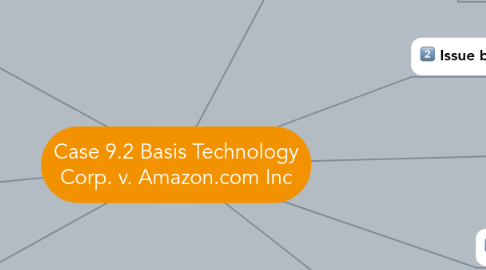
1. Two Current Business Practices
1.1. Signing loan documents electronically
1.2. the creation of electronic signature
2. Impact of the Decision
2.1. Set a precedent for enforceable electronic contracts
3. WHY?
3.1. The ruling provides a precedent for businesses and indivduals transacting through electronic communications to have an enforceable contract without it needing to be on paper
4. Facts
4.1. Parties
4.1.1. Basis Technology Corp
4.1.2. Amazon.com Inc
4.2. What Happened
4.2.1. In 1999, Basis and Amazon entered into stock-purchase agreements
4.2.2. Amazon objected to certain actions related to the securities that basis sold
4.2.3. Basis sued Amazon for various claims
4.2.3.1. involving securities transactions
4.2.3.2. failing to pay for services performed not included in original agreement
4.2.4. Two parties reached an agreement out of court through a series of e-mail exchanges
4.2.4.1. Amazon reneged
4.2.4.2. Basis filed motion to enforce
4.3. Procedural History
4.3.1. Trial judge ruled against Amazon,, which appealed
4.3.2. Appeals court affirmed the trial courts finding
5. Issue before the Court
5.1. whether the e-mail terms between Basis and Amazon were sufficiently complete and definite to form an agreement and whether Amazon had intended to be bound by them.
6. Rule of Law
6.1. electronic contract formation and enforceability
6.1.1. Plaintiff must show that the e-mail correspondence serves as an enforceable contract
7. Application
7.1. Basis argues that the "e-mail confirms the essential business terms of the settlement between our respective clients," and "agree that they promptly will take all steps to memorialize" those terms
7.1.1. correspondence between parties resulted in Amazon counsel replying to the business terms with "correct"
7.1.1.1. court considered the words used by the parties, the agreement taken as a whole, and surronding facts and circumstances.
7.2. Amazon claims that the e-mail terms were not sufficiently complete and definite for them to be bound by them.
8. Conclusion
8.1. Appeals Court of Massachusetts affirmed the trial court's finding that Amazon intended to be bound by the terms of the March 23 e-mail.
8.1.1. The trial judge terminated the trial based on the parties acknowledging they had come to an agreementl
8.1.2. e-mail constitutes a complete and unambiguous statement of the parties' desire to be bound by the settlement terms
